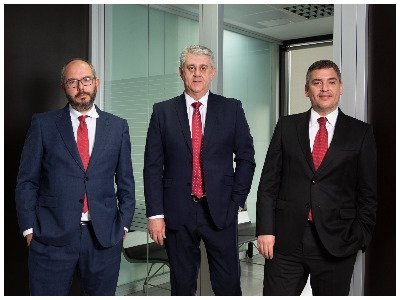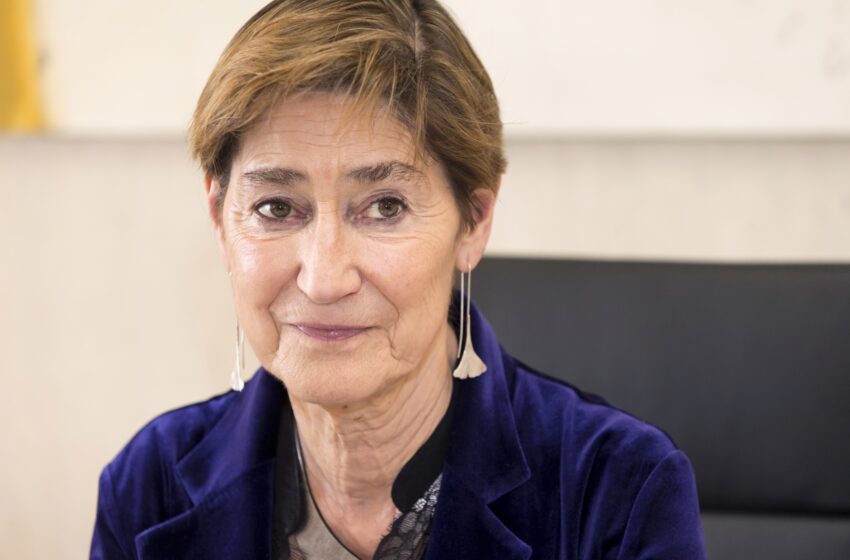Surviving two pandemics during 2020

To say that 2020 was a challenging year for Porto-headquartered Efacec would be a gross understatement. In this intriguing interview with general counsel Adeodato Pinto, the infamous Luanda Leaks scandal was discussed and the impact this had on the business. The company’s majority shareholder, Isabel dos Santos, who at the time was Africa’s richest woman, saw her assets frozen by the Angolan and Portuguese states. Despite these colossal challenges during this period, Efacec has fared admirably and, more importantly, survived, which resulted in the company becoming nationalised. Iberian Lawyer asked Adeodato about all of the challenges their Legal department faced, not to mention the COVID-19 pandemic and how external law firms are selected to work with Efacec.
 After over 12 years of working as a private practice lawyer, what made you decide to go in-house?
After over 12 years of working as a private practice lawyer, what made you decide to go in-house?
I decided to move to an in-house role, mostly due to the challenge of knowing the business, Efacec, and supporting the company from the beginning to the end. When I worked as a private practice lawyer at Cuatrecasas Portugal (2003-2014) and then at Miranda (2014-2015), I always loved working with industrial clients. I followed them very closely and loved the idea of the production and manufacturing process as well as supporting the structure from the management, to the commercial contracts, in order to understand the business. I was always interested in a role where I could perform these functions, and Efacec, being a huge company in the north of Portugal, was a great fit for me.
Can you summarise the last 12 months and the impact that COVID-19 has had on Efacec’s business?
I can summarise the last 12 months in the following ways. During the first two to three months of the pandemic, it felt like there were 24 hours until the end of the world, and I was having to find a way to work 48! In order to summarise 2020, if I was still at university and had to sit a Law exam that included a case study of what happened to Efacec during the last year and all the legal challenges we faced, I would never have believed that something like this could happen in real life! 2020 was a year in which we had to deal with serious compliance issues of our main shareholder at that time, Isabel dos Santos, arising from the Luanda Leaks story, and that affected a lot of countries where she had investments and ownership in companies. This was a huge challenge to manage, as it impacted the relationship of Efacec with all of its stakeholders. We had to manage damage control with clients, suppliers, financial institutions, employees and at the same time try to cooperate with all related parties to find a solution to unlock the shareholder issue. Following the Luanda Leaks news and upon invitation of the Board of Directors, Mrs Isabel dos Santos immediately agreed to sell her shares, but as you can imagine, there were several legal constraints to overcome in order to execute that transfer.
Following the request of the major shareholder, we conducted an M&A process that resulted in several non-binding offers received by June 2020, but at that time, the shares had been judicially seized both in Angola and in Portugal at the request of the Angolan state, and there was no way to conclude the deal. At the same time as this situation gained traction, there was obviously the COVID-19 pandemic which began to affect Europe more severely in March 2020, with several countries enforcing lockdown on its citizens, including Portugal. We had to deal with the different problems that the pandemic brought to export companies like ours. Borders closed, travel bans and employees prevented to go to or come from work sites. Force Majeure clauses were invoked either by us and by our suppliers but some of our work related to strategic electric or water infrastructures, and so those functions had to continue and we had to find legal exceptions to perform those functions. 80% of our contracts are outside of Portugal, such as in the USA, Denmark, the UK, India, Algeria, Rwanda and the countries of the Persian Gulf, so we had to organise ourselves in all of these different jurisdictions and quickly assess the impact of the pandemic and of the Covid-19 urgency legal amendments. They were truly demanding times.
The pandemic situation aggravated the difficulties we faced with the shareholder blockage and this impacted the relationship with the financial system, which ultimately blocked any financial support. We had to manage this process during the first semester of 2020. We had to change our business model and re-negotiate contracts with suppliers and clients. As all of our credit lines were suspended, we had to find innovative ways to find compromises. When I look back now, I am amazed at how the company reacted and survived during this period. Then on July 2nd the company was nationalised by the Portuguese government, and a whole new set of legal challenges started for the second half of the year. It was the first nationalisation of a non-financial company in Portugal for more than 40 years, so there was not much (if any) jurisprudence or even doctrine to help us assess all the effects and legal impacts of the nationalisation. The financial blockage was lifted, and we concluded a €70 million loan agreement in August and immediately started to try to solve the problems with suppliers and clients that had emerged during the first semester. The Legal department played a key role in supporting the management and the business units in all these issues, so I can say for sure that 2020 was, professionally the most challenging year ever for my team and for me, and I’d like to give note of the fantastic work that all my colleagues have performed.
How many people work in the legal department you lead today? Have you grown the team?
When I joined the company in 2015, we were a team of six, and now we are 10. By Portugal standards, it is a relatively big legal department. 80% of our business is overseas where we make international contracts. Almost all of our products are customised, and we have very few commodity products. Therefore, a lot of the contracts have to be tailored and are very different. We also have eight business units with different products. Throughout 40 countries in the world, we have 13 international subsidiaries and 29 overseas branches. I have a contract team with five lawyers, which gives direct support to the business units, where they review and negotiate contracts. Given the value size of the contracts my team has to review, they are mainly relatively senior lawyers. My team will review on average €330 million worth of contracts per year, which equates to roughly 80% of our contracts and Efacec’s business, and on top of that we also review the contractual documents of all the offers made by Efacec. We also work closely with the project teams of the 20 major projects of the company, which means that we globally handle contracts that easily overpass €1 billion a year.
How do you select your external legal advisors? Do you have panels/have lawyers pitch regularly for work? how much do you value sector experience?
We externalise 20% of our legal work to outside counsel (law firms). The commercial contracts we outsource legal work for tend to be Portuguese contracts as we mainly work with Portuguese law firms but if I have a contract in Italy, Spain or the US they are unable to advise us. Often this work will be done internally or we will seek a foreign or international law firm if the matter is very specialised, especially if the contract value is over €20 million. All Portuguese and overseas Dispute Resolution cases we use external counsel for. To give you an idea, we have around 20 open litigation cases now. The corporate work and housekeeping for our 13 international subsidiaries and 29 branches is managed by local law firms in those countries. The corporate team in our legal department are five lawyers, including myself, so we are split 50% in corporate and 50% in contracts. The Employment Law work is managed by our HR department. We don’t have a panel of preferred firms in Portugal, but I am working on this and would like to create one in the not too distant future. I rely on legal directories when choosing external counsel to work with overseas. We have been able to find a number of good medium-sized law firms we work within the different countries where we are. Unfortunately, our budget doesn’t allow us to always hire tier 1 or even tier 2 law firms as their fees are too high, especially in Europe, the USA and the Persian Gulf. We look for firms specialised in infrastructure contracts; therefore sector experience is very important and gives us a lot of comfort knowing they understand our business.
What changes have you seen in the legal market in the way law firms communicate with GCs?
I feel that law firms now understand the importance of communicating to us their sector experience, which is a very relevant and important issue. Understanding our business is fundamental to give confidence to our internal clients. The in-house department is often an intermediary between the business and our external advisors. Our colleagues and stakeholders trust us because we understand their language. It is really important for me that I can see that the external law firm we work with can speak our language and understand our business and culture. Otherwise, we have to act as translators between the internal business and outside counsel, which can be very time-consuming. I seek in external counsel a lawyer or team that I can discuss strategic points with. I need support sometimes with the decisions I make. It is not enough to know the law, but also to know our business and to help us think strategically managing all the stakeholders.
How is the legal tech evolution impacting your organisation and your relationship with external advisors?
I have seen a number of things happen and change in the market during the last few years with regards to Legaltech. Until 2019 I worked a lot with one of the big law firms here in Portugal, and they have some legal technology solutions which really helped our business. When the Brexit issue started to be relevant, we made an assessment of all of our contracts to see which had exposure to Brexit clauses. We asked this big law firm to perform a Due Diligence on all of our contracts with British clients, and they used AI software to analyse these contracts to determine risk exposure. This was very quick and comforting to us knowing the sophistication behind this process. This is the best example I can give you of firsthand experience with Legaltech in Portugal.
What is your biggest frustration when working with external law firms?
My biggest frustration when working with external counsel is when they stick to the law and just provide us with information about what the law or what the contracts state. We don’t need to be explained the law; we know the law. I can see what the law is, using internal resources. We need help to overcome problems and find solutions.
What do you value the most when working with external counsel?
One of the main things I try to find when we work with law firms, are lawyers that feel they are our lawyers, and not just lawyers of the law firm where they work. This is a very subtle thing, but it makes a big difference. The work for us is clearly given to them by the partner, and they then submit this work to their overseeing partner. Sometimes we want to know which lawyer is performing the work and build a relationship with them, and we don’t mind that it is not always the partner; we understand that. When working with the partner, I appreciate feeling that he or she is “my” lawyer, like in the old days, a person that will provide us with general strategical advice, and not only legal opinions, naturally based on legal knowledge, but also in all the experience gained during their professional life with their other customers. Firms that are able to balance this, we really value and appreciate.
To read the interview in full please download issue N.103
Interview by Michael Heron.












